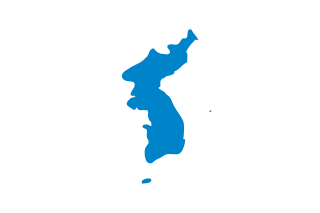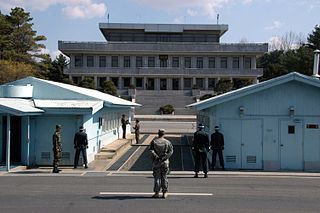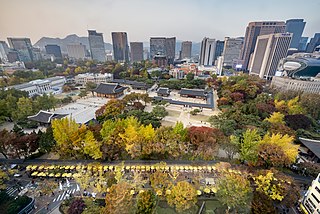
Korea is a peninsular region in East Asia consisting of the Korean Peninsula, Jeju Island, and smaller islands. Since the end of World War II in 1945, it has been politically divided at or near the 38th parallel; in 1948, two states declared independence, both claiming sovereignty over the entire region: North Korea in its northern half and South Korea in the south, which fought the Korean War from 1950 to 1953. The region is bordered by China to the north and Russia to the northeast, across the Amnok (Yalu) and Duman (Tumen) rivers, and is separated from Japan to the southeast by the Korea Strait.

Korean is the native language for about 81 million people, mostly of Korean descent. It is the national language of both North Korea and South Korea.

The Korean War was an armed conflict on the Korean Peninsula fought between North Korea and South Korea and their allies. North Korea was supported by the People's Republic of China and the Soviet Union, while South Korea was supported by the United Nations Command (UNC) led by the United States. Fighting ended in 1953 with an armistice, with no treaty signed.

North Korea, officially the Democratic People's Republic of Korea (DPRK), is a country in East Asia. It constitutes the northern half of the Korean Peninsula and borders China and Russia to the north at the Yalu (Amnok) and Tumen rivers, and South Korea to the south at the Korean Demilitarized Zone. The country's western border is formed by the Yellow Sea, while its eastern border is defined by the Sea of Japan. North Korea, like its southern counterpart, claims to be the sole legitimate government of the entire peninsula and adjacent islands. Pyongyang is the capital and largest city.

South Korea, officially the Republic of Korea (ROK), is a country in East Asia. It constitutes the southern part of the Korean Peninsula and borders North Korea along the Korean Demilitarized Zone; though it also claims the land border with China and Russia. The country's western border is formed by the Yellow Sea, while its eastern border is defined by the Sea of Japan. South Korea claims to be the sole legitimate government of the entire peninsula and adjacent islands. It has a population of 51.96 million, of which half live in the Seoul Capital Area, the ninth most populous metropolitan area in the world. Other major cities include Busan, Daegu, and Incheon.

Kim Jong Il was a North Korean politician who was the second supreme leader of North Korea. He led North Korea from the death of his father Kim Il Sung in 1994 until his death in 2011, when he was succeeded by his son, Kim Jong Un. Afterwards, Kim Jong Il was declared Eternal General Secretary of the Workers' Party of Korea (WPK).

Hanja, alternatively known as Hancha, are Chinese characters used to write the Korean language. After characters were introduced to Korea to write Literary Chinese, they were adapted to write Korean as early as the Gojoseon period.

The Korean Demilitarized Zone is a heavily militarized strip of land running across the Korean Peninsula near the 38th parallel north. The demilitarized zone (DMZ) is a border barrier that divides the peninsula roughly in half. It was established to serve as a buffer zone between the countries of North Korea and South Korea under the provisions of the Korean Armistice Agreement in 1953, an agreement between North Korea, China, and the United Nations Command.

From 1910 to 1945, Korea was ruled as a part of the Empire of Japan under the name Chōsen (朝鮮), the Japanese reading of "Joseon".

K-pop, short for Korean popular music, is a form of popular music originating in South Korea. It includes styles and genres from around the world, such as pop, hip hop, R&B, rock, jazz, gospel, reggae, electronic dance, folk, country, disco, and classical on top of its traditional Korean music roots. The term "K-pop" became popular in the 2000s, especially in the international context. The Korean term for domestic pop music is gayo, which is still widely used within South Korea. While "K-pop" can refer to all popular music or pop music from South Korea, the term is often used when referring to artists associated with the entertainment and idol industry in the country, regardless of the genre of music output.

The South Korea national football team represents South Korea in men's international football and is governed by the Korea Football Association. South Korea has emerged as a major football power in Asia since the 1980s, having participated in ten consecutive and eleven overall FIFA World Cup tournaments, the most for any Asian country. Despite initially going through five World Cup tournaments without winning a match, South Korea became the first Asian team to reach the semi-finals when they co-hosted the 2002 tournament with Japan. South Korea also won two AFC Asian Cup titles, and finished as runners-up on four occasions. Furthermore, the team won three gold medals and three silver medals at the senior Asian Games.
Korean drama, also known as K-drama or Koreanovela, refers to Korean-language television shows made in South Korea. These shows began to be produced around the early 1960s, but were mostly consumed domestically until the rise of the Korean Wave in the 1990s. They have since achieved significant international popularity, with millions of viewers across the world.

Kim Jong Un is a North Korean politician who has been supreme leader of North Korea since December 2011 and the general secretary of the Workers' Party of Korea (WPK) since 2012. He is the third son of Kim Jong Il, who was the second supreme leader of North Korea, and a grandson of Kim Il Sung, the founder and first supreme leader of the country.

Seoul, officially Seoul Special Metropolitan City, is the capital and largest city of South Korea. The broader Seoul Capital Area, encompassing Gyeonggi province and Incheon Metropolitan City, emerged as the world's sixth largest metropolitan economy in 2022, trailing behind Paris, San Francisco, Los Angeles, Tokyo, and New York, and hosts more than half of South Korea's population. Although Seoul's population peaked at slightly over 10 million, it has gradually decreased since 2014, standing at approximately 9.97 million residents as of 2020. Seoul is the seat of the South Korean government.

Kim Il Sung was a North Korean politician and revolutionary. He founded the Democratic People's Republic of Korea, commonly known as North Korea, which he led as Supreme Leader from its establishment in 1948 until his death in 1994. Afterwards, he was succeeded by his son Kim Jong Il and was declared Eternal President.

2NE1 is a South Korean girl group formed by YG Entertainment, which was active between 2009 and 2016, before reforming in 2024. The group is composed of four members: Bom, CL, Dara, and Minzy. Known for breaking typical stereotypes of K-pop, musical experimentation, fashion, and stage presence, they are recognized for expanding girl group styles in the Korean music industry and became one of the leading figures of the Korean wave.

BTS, also known as the Bangtan Boys, is a South Korean boy band formed in 2010. The band consists of Jin, Suga, J-Hope, RM, Jimin, V, and Jungkook, who co-write or co-produce much of their material. Originally a hip hop group, they expanded their musical style to incorporate a wide range of genres, while their lyrics have focused on subjects including mental health, the troubles of school-age youth and coming of age, loss, the journey towards self-love, individualism, and the consequences of fame and recognition. Their discography and adjacent work has also referenced literature, philosophy and psychology, and includes an alternate universe storyline.

The Korean alphabet, known as Hangul or Hangeul in South Korea and Chosŏn'gŭl in North Korea, is the modern writing system for the Korean language. The letters for the five basic consonants reflect the shape of the speech organs used to pronounce them. They are systematically modified to indicate phonetic features. The vowel letters are systematically modified for related sounds, making Hangul a featural writing system. It has been described as a syllabic alphabet as it combines the features of alphabetic and syllabic writing systems.

Samsung Group is a South Korean multinational manufacturing conglomerate headquartered in Samsung Digital City, Suwon, South Korea. It comprises numerous affiliated businesses, most of them united under the Samsung brand, and is the largest South Korean chaebol. As of 2024, Samsung has the world's fifth-highest brand value.

Twice is a South Korean girl group formed by JYP Entertainment. The group is composed of nine members: Nayeon, Jeongyeon, Momo, Sana, Jihyo, Mina, Dahyun, Chaeyoung, and Tzuyu. Twice was formed under the television program Sixteen (2015) and debuted on October 20, 2015, with the extended play (EP) The Story Begins, and has received the honorific title of "The Nation's Girl Group" in their home country.


















